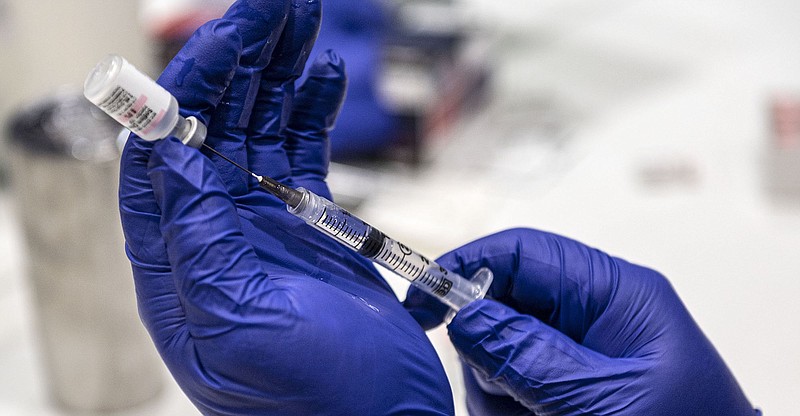A small but growing number of people in Northwest Arkansas and the River Valley are getting third doses of the Pfizer covid-19 vaccine.
Meanwhile, the number of covid-19 hospitalizations in the region declined slightly this week.
Since booster doses became available to certain groups of people last month, 19,733 people in Benton, Washington, Crawford and Sebastian counties have received a third dose, according to data from the Arkansas Department of Health.
People over the age of 65, people age 50 to 64 with underlying health conditions, and residents of long-term care facilities should get a booster dose of the Pfizer vaccine, according to the Centers for Disease Control and Prevention.
The booster shot is especially important for the older population as well as those who work in high-risk settings, such as health care workers and teachers, said Dr. Michael Bolding, a hospitalist at Washington Regional Medical Center in Fayetteville.
Studies have shown antibodies from the vaccine start to decrease after about six months, and Bolding said he is starting to see that play out in the clinical setting. Over the past few weeks, Bolding said, he has admitted several older vaccinated patients into the hospital who were sick with covid-19.
People over 18 with medical conditions, and employees or students in settings with an increased risk for getting covid-19, are also eligible for a Pfizer booster vaccine, according to the CDC.
Bolding encouraged people in these categories considering a third dose to think in terms of population health and individual health. For population health, the community needs to reach herd immunity to help end the pandemic. On an individual basis, a booster dose decreases the chances of getting the virus or getting really sick from the virus, with very little risk, he said.
Vaccine reactions to the third dose are similar to the second dose, Bolding said.
Over the past 18 months, Bolding has admitted thousands of patients to the hospital with covid-19 and only one with vaccine side effects, he said. The patient was a young male with myocarditis, or inflammation of the heart, who was discharged from the hospital in 48-72 hours and went home with no ill effects, he said.
Third doses are only available to eligible people who received first and second doses of the Pfizer vaccine and meet certain criteria, but booster doses may be coming in the near future for those who received the Moderna or Johnson & Johnson shots.
On Thursday, an independent advisory panel to the Food and Drug Administration recommended a booster dose of the Moderna vaccine for people age 65 and older and for adults who are at high risk for severe illness because of underlying conditions or exposure on the job.
The panel made a similar recommendation for the Johnson & Johnson vaccine Friday. The recommendations will be considered by FDA officials, who are expected to reach a decision within days, according to The Associated Press.
Prepare for the holidays
For people who haven't gotten the vaccine, now is the time to get it to be ready for holiday gatherings, Bolding said.
Getting the Pfizer and Moderna vaccines is a five- or six-week process, he said. It takes three to four weeks between the first and second shots, followed by two weeks after the second shot to gain full immunity, he said.
With the delta variant, there is no such thing as being at low-risk for getting a severe case of covid-19, Bolding said. He has seen healthy patients in their 20s and 30s who don't survive their hospital stays, he said.
Holiday gatherings often include groups of people indoors from different households. The only way to celebrate together safely is for everyone to be vaccinated, he said.
In order for the community to be safe from covid-19 spread, about 75% of the population needs to attain immunity, Bolding said.
Overall, 61.6% of the population in Benton County, 52.5% in Crawford County, 53.9% in Sebastian County and 63.8% in Washington County has been partially or fully vaccinated, according to the Department of Health.
In Arkansas, 64.7% of the population is partially or fully vaccinated, according to the state Health Department, and nationally, 65.8% of the population has had at least one dose, according to the CDC.
Hospitalizations, new cases
As of Thursday, 67 patients were hospitalized with covid-19 in Northwest Arkansas, down from 70 last week, according to the Northwest Arkansas Council. The all-time high was 173 on Aug. 11.
A total of 101 patients were in intensive care units, down from 106 last week, and patients on ventilators were down from 45 to 41. These numbers include patients with covid-19 and other medical needs.
The River Valley also saw a decline in covid-19 patients. Mercy Hospital in Fort Smith had 19 covid patients, including seven in the ICU, on Friday, compared to 21 the previous week, with eight in the ICU, according to spokeswoman Mardi Taylor.
Baptist Health's hospitals in Fort Smith and Van Buren had a combined 34 covid-19 patients, including 18 in covid critical care units and nine on ventilators Friday, according to spokeswoman Alicia Agent. A week ago, the two hospitals had a combined 39 covid-19 patients, with 18 in critical care units.
Statewide, 501 patients were hospitalized with covid-19 on Friday, 263 were in ICU and 161 were on ventilators, according to Katie White, spokesperson for the Arkansas Department of Health.
There were 76 new cases of covid-19 in Benton County on Thursday and 82 new cases in Washington County.
As of Friday, Benton, Washington, Crawford and Sebastian counties had seen 55 new deaths related to covid-19 since last week, for a total of 1,595 since the pandemic began, according to the Department of Health.
More News
Percentages of people with a third dose of Pfizer covid-19 vaccine:
• Benton County: 3.6%
• Washington County: 3.7%
• Sebastian County: 3.0%
• Crawford County: 1.5%
• Arkansas: 3.3%
• U.S.: 5.2%
Source: Arkansas Department of Health and the Centers for Disease Control and Prevention

